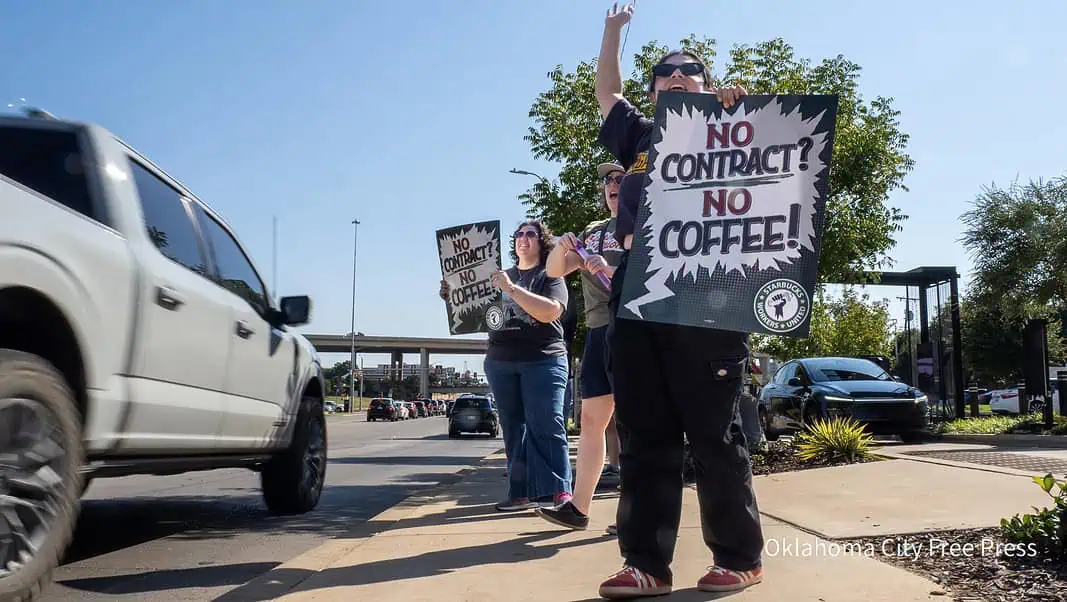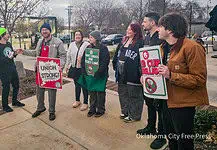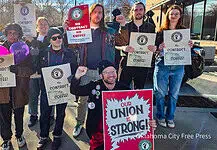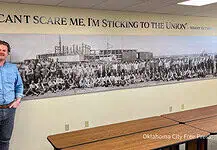OKLAHOMA CITY — Baristas and labor allies staged an informational practice picket outside the Starbucks at NW 23rd Street and Robinson on Wednesday morning, joining a national wave of demonstrations calling on the coffee giant to settle a first union contract.
The action was one of more than 35 similar pickets across the country organized by Starbucks Workers United, the union representing about 12,000 workers at 650 stores in 45 states.
Baristas and their supporters say they are demanding improved staffing, hours, take-home pay, and stronger on-the-job protections, while pushing back against what they describe as the company’s “union busting” and unfair labor practices.
National movement, local stakes
In Oklahoma City, union supporters gathered with signs and chants along NW 23rd Street, drawing honks of support from passing drivers. Among them was Isabella Rodriguez, political director for the Oklahoma AFL-CIO, who described the rally as part of a broader effort to “speak the truth to the workers’ lived experience.”
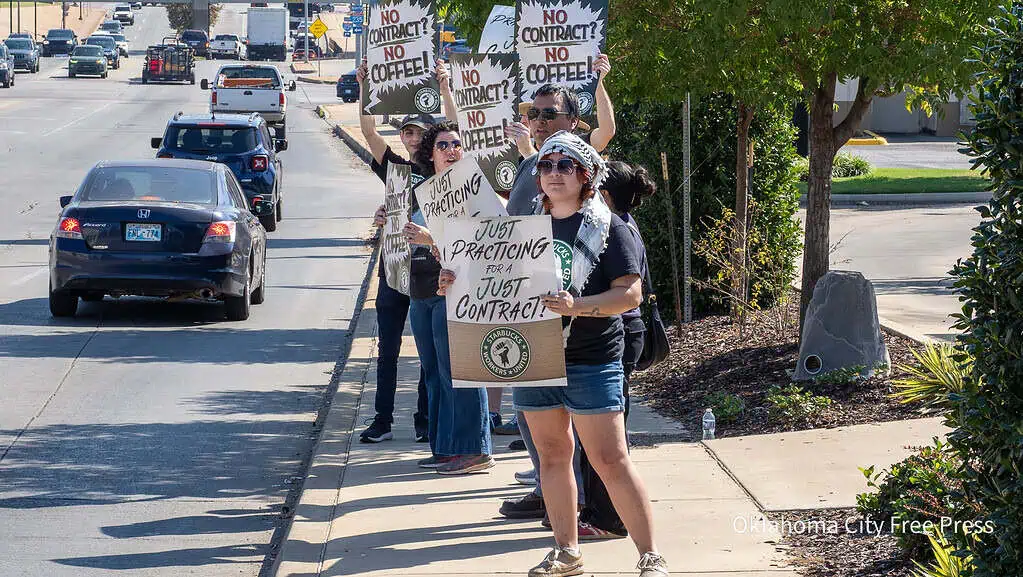
Rodriguez said public perception often lags behind the reality of baristas’ conditions. “The capitalistic society makes everybody think that things are fine because those CEOs are continually increasing their profits for their shareholders,” she said. “But they are actually committing wage theft. They are not properly compensating their workers. They are continually stripping their rights.”
She argued that while some define wage theft as managers underreporting hours or withholding tips, the broader systemic problem is Starbucks’ compensation model. “This is how they rake in money, by treating our workers like slave labor, rather than giving them the dignity they deserve by being able to work one job and make a living wage,” Rodriguez said.
Former baristas show solidarity
For some on the picket line, the demonstration was personal. Cecilia Martin, who worked at Starbucks from 2014 to 2019, credited the company’s tuition reimbursement program with helping her earn a degree but said working conditions have worsened.
“In recent months, there’s just been outrageous expectations of the baristas,” Martin said. “They’re cutting labor, which is really hard… and they are shutting down stores. There’s, like, thousands of workers displaced.”
Martin said she now participates in online Starbucks groups and tries to offer encouragement but joined Wednesday’s picket “in solidarity.”
Contract talks stalled
Inside the company’s bargaining with Workers United, both sides acknowledge progress but differ sharply on what remains unresolved. Starbucks Workers United leaders say they are “stonewalled” in trying to finalize a contract.
Collin Pollitt, a 13-year Starbucks worker at the 23rd Street store, serves as a lead organizer and elected strike captain. He told us union members are prepared to escalate if negotiations fail.
“We have made 90 percent progress in bargaining our first union contract,” Pollitt said. “We’re stonewalled by the company to finish this last 10 percent. The company has yet to resolve hundreds of unfair labor practices or finish our contract bargain with us. So this is a National Week of action, of practice pickets… we’re prepared to strike if necessary.”
We’re prepared to strike if necessary.— Collin Pollitt, elected strike captain for OKC 23rd St. Starbucks workers
Pollitt said recent store closures ordered by Starbucks CEO Brian Niccol have disproportionately affected unionized shops but noted that organizing has secured some protections.
“Union workers have received better severance packages and better closing deals, an ability to transfer to another nearby store, and we’re committed to, if we do go to another store, continuing to organize,” he said.
Broader labor support
Labor leaders outside Starbucks said Wednesday’s action is part of a longer fight. Tim O’Connor, president of the Central Oklahoma Labor Federation, said he sees parallels with other workplace struggles.
“This is just one of a series of attacks on working folks that seems to have escalated,” O’Connor said. He noted that Starbucks baristas at the 23rd Street store organized nearly two years ago, but still lack a finalized contract. “That’s how a lot of new unions die on the vine—just that stalling,” he said.
Organizers also tied the picket to wider political and economic conditions. Jacob Bone, a barista at 23rd Street, has been active in local organizing since the early Starbucks campaigns. He said the movement has grown despite resistance.
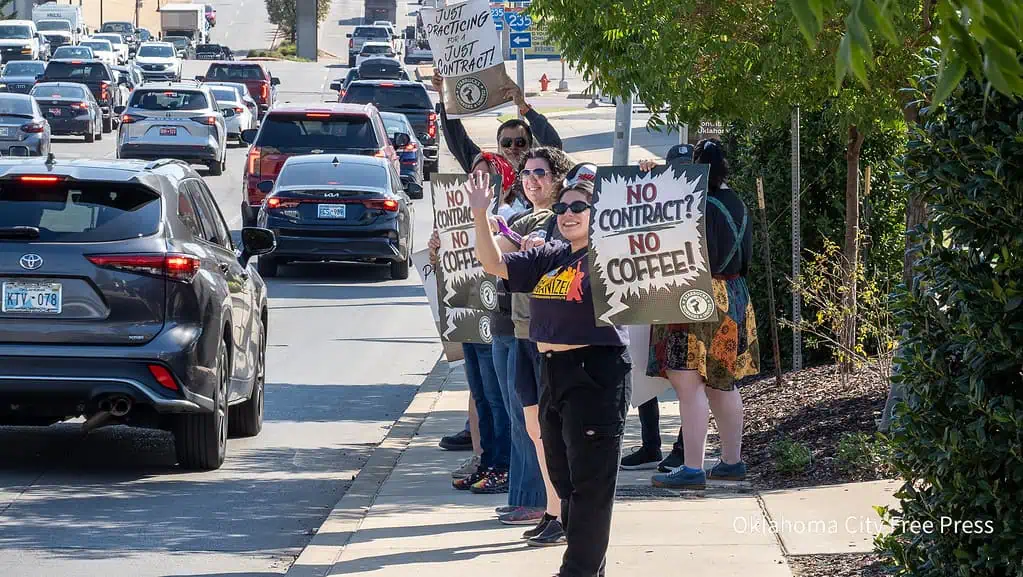
“We’ve seen that time again when we’ve been out here,” Bone told Free Press. “As this campaign has gone on, it started out with some of the most heinous union busting that we’ve seen recently, and then now we’re kind of just in a stalemate, waiting for them to come back with a fair offer that’s going to allow us to have fair wages that, you know, we need to beat inflation. We need to pay our rent. We want to live in this community… we need fair wages to do that.”
Pressure on Starbucks
Starbucks Workers United leaders argue that settling a contract would cost the company less than one day of average sales.
At the same time, corporate filings show Niccol received $96 million in compensation for four months of work in 2024—what labor groups describe as the largest CEO-to-worker pay gap in the nation.
Nationally, major unions and allied organizations representing more than 85 million people have pledged to support Starbucks baristas, including honoring picket lines if a strike is called. Workers United officials say hundreds of strike captains have already been elected to prepare for that possibility.
Investor groups have also expressed concern about the company’s direction, including a letter from the SOC Investment Group warning of underperformance. A recent survey of baristas by the Strategic Organizing Center reported that 91 percent of respondents said their stores were understaffed and 93 percent said the shortages led to long wait times for customers.
Looking ahead
Wednesday’s Oklahoma City picket was framed as a practice action, but organizers emphasized that workers are prepared to strike if contract talks remain stalled.
“We are stronger when we organize,” Pollitt said. “We are fighting for a fair contract.”
Brett is the founder and former Editor in Chief of Oklahoma City Free Press. His leadership created and developed this company into a vital and valuable source of news and community in OKC.
Dickerson retired in 2026. He continues to contribute support and photography to the efforts of the publication.
